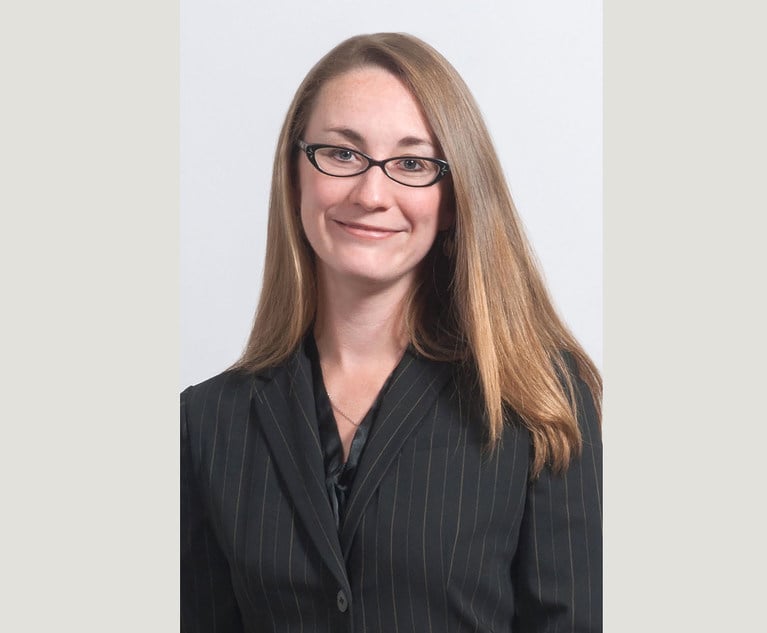Where Do You Want to Be Sued?
Where does your company want to be sued? Of course, the obvious answer is “nowhere.” But in this litigious country that is not realistic.
January 31, 2018 at 10:35 AM
6 minute read

Where does your company want to be sued? Of course, the obvious answer is “nowhere.” But in this litigious country that is not realistic. However, to a large extent, companies can chose the forum to decide claims made against them. The choice is not necessarily an easy one, given competing considerations that this article reviews.
First, the available choices should be understood. For contract claims, it is generally possible to designate in the contract the litigation forum. Those choice-of-forum clauses will be upheld, absent some extraordinary circumstances. Of course, this point is limited to contract claims against business entities, not consumers, and may also not always be possible in suits by consumers if the contract designates a truly difficult or distant forum. State laws do limit some overreaching consumer contracts.
Second, some types of business litigation must by statute be filed in federal court, although which federal court may be left to be designated by contract or possibly bylaws. The U.S. Supreme Court will shortly decide in the Cyan case if the Securities Litigation Uniform Standards Act of 1998 requires securities claims under the 1933 Act to be filed only in federal court.
But putting those examples aside, the question remains: may a business entity limit where business tort claims, such as breaches of fiduciary duty, may be filed? And if such limitations may be imposed, are they a good idea? We believe those limitations should be adopted, but admit there are arguments to not do so.
The Delaware General Corporation Law, Section 115 expressly permits a certificate of incorporation or a bylaw to limit where such business tort suits may be filed. It provides:
The certificate of incorporation or the bylaws may require, consistent with applicable jurisdictional requirements, that any or all internal corporate claims shall be brought solely and exclusively in any or all of the courts of this state, and no provision of the certificate of incorporation or the bylaws may prohibit bringing such claims in the courts of this state. “Internal corporate claims” means claims, including claims in the right of the corporation, that are based upon a violation of a duty by a current or former director or officer or stockholder in such capacity, or as to which this title confers jurisdiction upon the Court of Chancery.
But what exactly does this statute permit? There is at least some argument that the statute bars mandatory arbitration provisions as invalid attempts to divest Delaware of jurisdiction over suits involving the internal affairs of Delaware corporations.
It is also not clear what constitutes “internal corporate claims,” although the statute tries to define that term. At least one Delaware decision held that what seemed to be a garden-variety breach of fiduciary duty claim fit within the definition of a “securities claim” because it involved a Delaware corporation's “securities.” If such a suit is characterized as a “securities claim,” it is not clear if a bylaw may prohibit it from being filed outside of Delaware. Nonetheless, there is substantial agreement that typical class or derivative actions do fall within the scope of forum selection bylaws adopted under Delaware law.
Should your corporation adopt such a bylaw, whether under Delaware law, the law of some other states' incorporation laws or under the common law of contracts? If as some authority has held, corporate bylaws are “contracts” that stockholders implicitly accept by buying stock, such “common law” bylaws may be valid in states other than those whose corporate laws expressly validate such a bylaw.
The advantages of forum selection bylaws under Delaware law are well known. For years merger-related litigation was filed in multiple jurisdictions by the plaintiffs bar, contending the merger involved a breach of directors' duties. Defending multi-state litigation is expensive and the results may be inconsistent. Those sort of expensive and possibly inconsistent results may be avoided if the corporation's bylaws required that such litigation only be filed in Delaware.
Even possibly more important, recent Delaware decisions have limited much of the merger litigation that led to quick, but costly settlements. The Trulia decision effectively ended so-called “disclosure only” settlements over mergers. The Corwin decision now precludes litigation over transactions approved by a properly informed majority of disinterested stockholders. All the advantages to the corporation or its directors of these precedents will follow from having such claims against them litigated in Delaware.
Yet, there are also potential disadvantages to forum selection bylaws. When multiple complaints are filed in several jurisdictions, the corporate defendant has the ability to choose who to approach for a fast settlement that will bind the plaintiffs in other jurisdictions. The ability to choose the weakest link is a possible advantage. For example, defendants in merger-related litigation have long sought fast settlements for comparatively small sums, but including “galaxy” wide releases of liability. Those settlements insulate the deal from further attack and let it proceed.
The ability to choose where to litigate multiple suits is no mere vague pipe dream. Just recently, the Delaware Supreme Court held that a Delaware derivative suit must be dismissed because the defendants had won a motion to dismiss a similar suit in Arkansas. California State Teachers Retirement System v. Alvarez, Del. Supr. C.A. No. 295, 2016 (Jan. 25). The defendants in Alvarez deliberately chose to litigate in Arkansas rather than in Delaware, apparently because they believed the Arkansas case was the easier one to have dismissed for failure to show demand on the board was excused. They were right.
Finally, the Delaware courts at least are generally considered impartial and do not favor a litigant just because it is a Delaware entity or has a Delaware lawyer. There is little home-field advantage in litigation in Delaware. In contrast, in those states with elected judges, there is often the perception of home-field advantages. If you do not mandate Delaware as your forum, it may well be that the litigation filed in your principal place of business will be to your advantage.
It will come as no surprise that we favor bylaws that require a Delaware forum. The advantages of a neutral forum, with established law and judges experienced in resolving business disputes outweigh any disadvantages. Any decrease in litigation risk is best over the long term.
Edward M. McNally ([email protected]) is a partner at Morris James in Wilmington and a member of its corporate and fiduciary litigation group. He practices primarily in the Delaware Superior Court and Court of Chancery, handling disputes involving contracts, business torts, and managers and stakeholders of Delaware business organizations.
This content has been archived. It is available through our partners, LexisNexis® and Bloomberg Law.
To view this content, please continue to their sites.
Not a Lexis Subscriber?
Subscribe Now
Not a Bloomberg Law Subscriber?
Subscribe Now
NOT FOR REPRINT
© 2025 ALM Global, LLC, All Rights Reserved. Request academic re-use from www.copyright.com. All other uses, submit a request to [email protected]. For more information visit Asset & Logo Licensing.
You Might Like
View All
After 2024's Regulatory Tsunami, Financial Services Firms Hope Storm Clouds Break



Improperly Pled Bitcoin Suit Leads to $88K in Attorney Fees Being Wiped Out
5 minute readTrending Stories
Who Got The Work
J. Brugh Lower of Gibbons has entered an appearance for industrial equipment supplier Devco Corporation in a pending trademark infringement lawsuit. The suit, accusing the defendant of selling knock-off Graco products, was filed Dec. 18 in New Jersey District Court by Rivkin Radler on behalf of Graco Inc. and Graco Minnesota. The case, assigned to U.S. District Judge Zahid N. Quraishi, is 3:24-cv-11294, Graco Inc. et al v. Devco Corporation.
Who Got The Work
Rebecca Maller-Stein and Kent A. Yalowitz of Arnold & Porter Kaye Scholer have entered their appearances for Hanaco Venture Capital and its executives, Lior Prosor and David Frankel, in a pending securities lawsuit. The action, filed on Dec. 24 in New York Southern District Court by Zell, Aron & Co. on behalf of Goldeneye Advisors, accuses the defendants of negligently and fraudulently managing the plaintiff's $1 million investment. The case, assigned to U.S. District Judge Vernon S. Broderick, is 1:24-cv-09918, Goldeneye Advisors, LLC v. Hanaco Venture Capital, Ltd. et al.
Who Got The Work
Attorneys from A&O Shearman has stepped in as defense counsel for Toronto-Dominion Bank and other defendants in a pending securities class action. The suit, filed Dec. 11 in New York Southern District Court by Bleichmar Fonti & Auld, accuses the defendants of concealing the bank's 'pervasive' deficiencies in regards to its compliance with the Bank Secrecy Act and the quality of its anti-money laundering controls. The case, assigned to U.S. District Judge Arun Subramanian, is 1:24-cv-09445, Gonzalez v. The Toronto-Dominion Bank et al.
Who Got The Work
Crown Castle International, a Pennsylvania company providing shared communications infrastructure, has turned to Luke D. Wolf of Gordon Rees Scully Mansukhani to fend off a pending breach-of-contract lawsuit. The court action, filed Nov. 25 in Michigan Eastern District Court by Hooper Hathaway PC on behalf of The Town Residences LLC, accuses Crown Castle of failing to transfer approximately $30,000 in utility payments from T-Mobile in breach of a roof-top lease and assignment agreement. The case, assigned to U.S. District Judge Susan K. Declercq, is 2:24-cv-13131, The Town Residences LLC v. T-Mobile US, Inc. et al.
Who Got The Work
Wilfred P. Coronato and Daniel M. Schwartz of McCarter & English have stepped in as defense counsel to Electrolux Home Products Inc. in a pending product liability lawsuit. The court action, filed Nov. 26 in New York Eastern District Court by Poulos Lopiccolo PC and Nagel Rice LLP on behalf of David Stern, alleges that the defendant's refrigerators’ drawers and shelving repeatedly break and fall apart within months after purchase. The case, assigned to U.S. District Judge Joan M. Azrack, is 2:24-cv-08204, Stern v. Electrolux Home Products, Inc.
Featured Firms
Law Offices of Gary Martin Hays & Associates, P.C.
(470) 294-1674
Law Offices of Mark E. Salomone
(857) 444-6468
Smith & Hassler
(713) 739-1250






